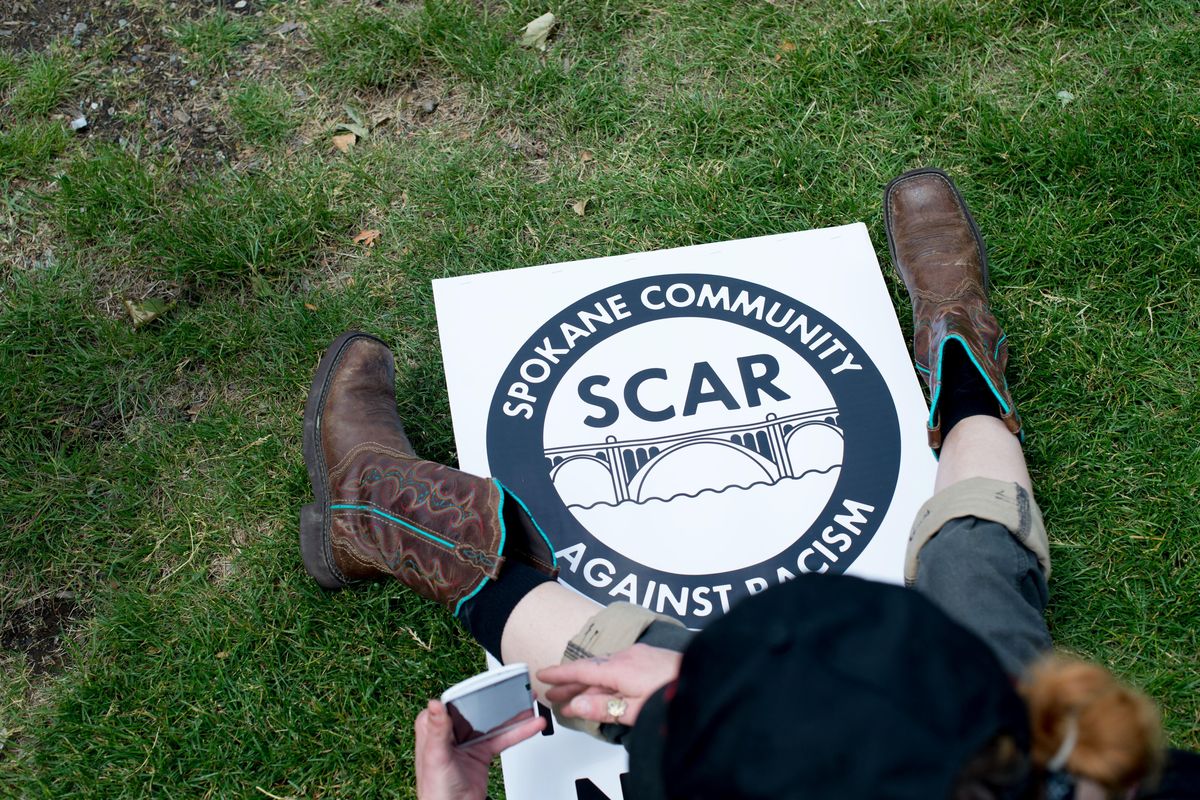March for Racial Justice seeks to tie shooting acquittal to broader issues of race

With a cadence betraying his roots as a Baptist preacher, Rev. Walter Kendricks made it clear Saturday he’s in for a long struggle.
“I no longer ask,” he said. “We’re demanding justice.”
Kendricks led the March for Racial Justice through the streets of East Central Spokane, and said it’s only the first action in a new push to tackle disparities in Spokane’s criminal justice system.
The catalyst for the march was the controversial acquittal of Edward Bushnell, a white man who shot a black man, William Poindexter, in the back after trying to stop Poindexter from beating his girlfriend. Jurors decided last month that Bushnell acted in self-defense, prompting outcry from some black churches and community groups.
In speeches before the march, Kendricks and other community leaders addressed the shooting, but tied it in to what they said is a broader issue: Black and Native American people in Spokane are disproportionately stopped by police and arrested, while being underrepresented on juries and in courtrooms.
Sandy Williams, one of the march organizers and a leader with the newly formed group Spokane Community Against Racism, said the hope was to channel community outrage over the verdict into awareness that it occurred “within a system that has a lot of problems,” she said.
One of the community’s frustrations has been the lack of funding in an ongoing grant to address jail overcrowding in Spokane. The county was awarded $1.75 million last year, in part because its application focused on addressing racial disparities in the jail and seeking community engagement.
But little of the funding in the grant is actually going toward training on racial equity, Williams said. Outside of a subcommittee working on racial equity, few slots on the council administering the grant are held by people of color.
“I believe that where you spend your money is an indication of where your priorities are,” Williams said. She said the way racial equity and community engagement were highlighted in the grant didn’t match what’s being done now.
“If they had been honest … I wonder if they still would have gotten the grant,” she said.
A new study from Eastern Washington University and the Spokane Police Department released last month also validated what activists in Spokane have long said, which is people of color are disproportionately stopped by Spokane police.
The study’s author, Ed Byrnes, a professor of social work at EWU, analyzed almost 40,000 police stops over 2 1/2 years. He concluded that even controlling for the fact that police are more likely to stop people in high-crime neighborhoods, being black or Native American increased a person’s chance of being stopped.
At the march Saturday, Williams said Spokane needs to stop pretending to be colorblind.
“In Spokane, we don’t see color,” she began, before reciting a long list of facts about racial disparities in Spokane: data on police stops from Byrnes’ report, on the high number of black students suspended in Spokane schools and on the racial disparities in Spokane’s jail.
“I’m starting to think that just maybe we need to start seeing color,” she said.
Kendricks addressed the verdict in the Poindexter case as Poindexter’s family members looked on.
“Based on current law, the verdict that the jury returned was correct,” Kendricks said, referring to Washington’s broad law allowing shooters to claim self-defense. But state law doesn’t always line up with moral law, he said.
Though Poindexter was black and the man who killed him was white, Kendricks said you don’t have to view the verdict through a racial lens to see something wrong with being able to claim self-defense after shooting a man in the back.
“You all know that something was wrong,” he continued, drawing murmurs of agreement from the crowd.
The march was a community effort, attended by a racially diverse group of about 200 people, from children to seniors. No elected officials or uniformed police officers were there as a long line of people holding “Black Lives Matter” and “No Justice, No Peace” signs marched along Fifth Avenue from Liberty Park to the site where Poindexter was shot and killed.
Jacob Johns, a local artist and member of the Hopi Tribe, sang a unity song in Hopi, accompanying himself on a drum. Kitara Johnson was asked to sing for the march and said after much reflection she decided on “A Change is Gonna Come,” a civil rights anthem written in 1964.
“When you hear of injustice, when it’s so close to home, it’s hard to sing. It’s hard to sing when you’re not happy,” she said.
Newly appointed Spokane NAACP president Kurtis Robinson delivered a fiery impromptu speech, calling on people to follow Jesus’ example by entering places of power and holding people accountable.
“This is not about an agenda. This is about equality. This is about equity,” he said.
The march went to Altamont Street and turned left, gathering in a semi-circle in an alley near the spot where Poindexter was shot and killed. Williams held a plant and invited community members to gather and pour water over it, following a tradition in many African cultures of pouring libations out for dead ancestors.
Back in Liberty Park, marchers were invited to join the annual Juneteenth celebration on Monday. Kendricks, the president of the Spokane Ministerial Fellowship, said more actions would be forthcoming, though he did not elaborate.
“Justice, if she is true, she must agree with the demand that we make today,” he said.